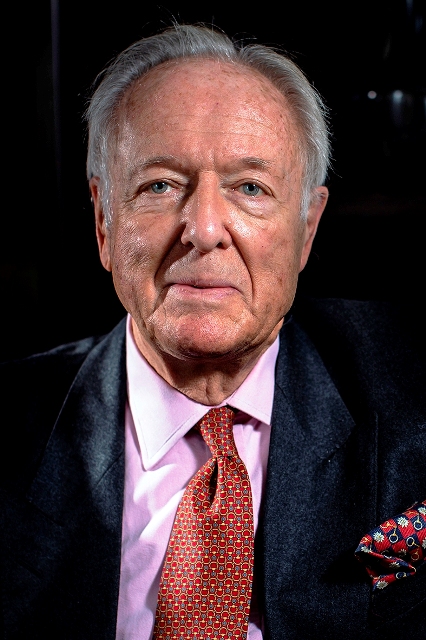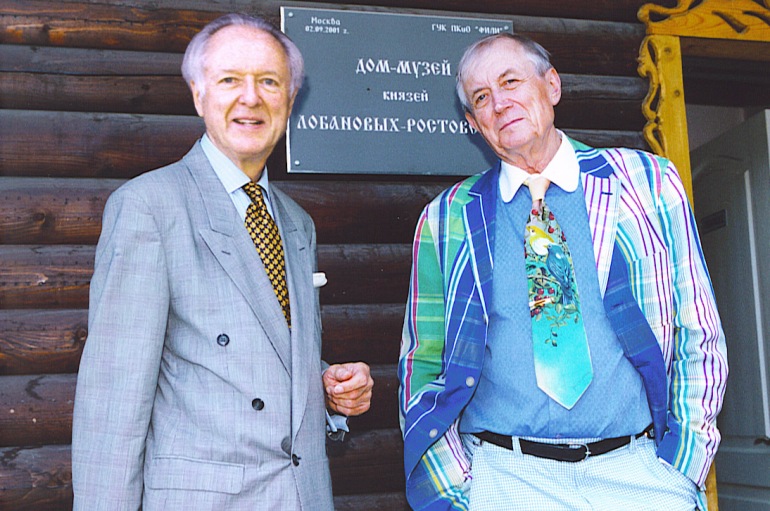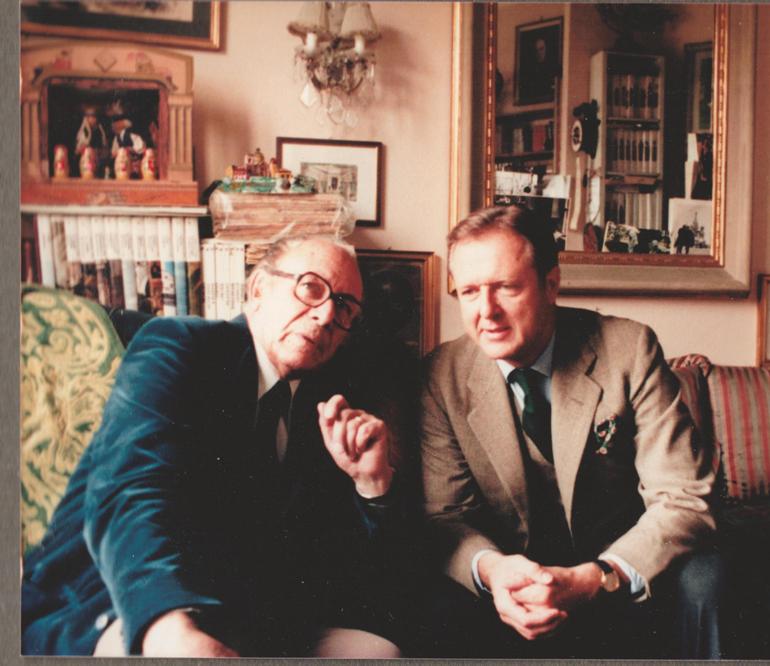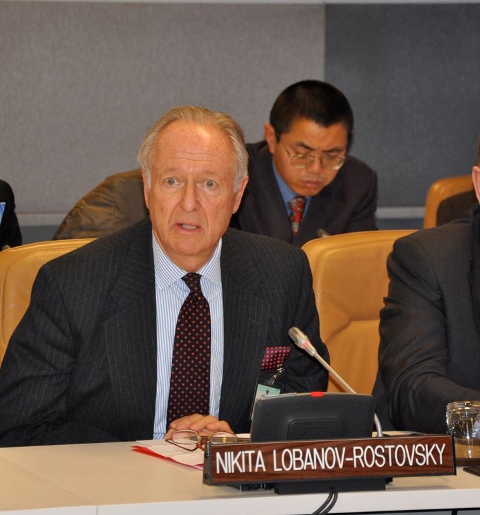
Nikita Lobanov-Rostovsky, “Together we can accomplish what our ancestors never got chance to.”
/ Главная / Russkiy Mir Foundation / Publications / Nikita Lobanov-Rostovsky, “Together we can accomplish what our ancestors never got chance to.”Nikita Lobanov-Rostovsky, “Together we can accomplish what our ancestors never got chance to.”
Julia Goryacheva
Nikita Lobanov-Rostovsky (UK) is one of the most renowned and active representatives of the old Russian emigrant community, co-founder of the International Council of Russian Compatriots (ICRC), Russian art collector and philanthropist. He told the Russkiy Mir about the history of his family that had left Soviet Russia in 1919 and his public activities.

Nikita Lobanov-Rostovsky
– Rurikovich at the turning-point of times is a book published this year for your 85th birthday. What does it mean for you today to be a descendant of Rurik, the founder of Russia?
– Despite the fact that I am Rurikovich, Russia cannot be formally considered as my homeland by place of birth since I was born in Bulgaria. But Russia is my Fatherland, and my ancestors fought for its well-being for 900 years. I also do my best to follow their path despite the challenges encountered.
I took part in the initiative to install two historical and cultural monuments. One was the monument commemorating the centenary of the First World War on Poklonnaya Gora in Moscow, and the other one was the monument commemorating the end of the Civil War in November 1920 to be installed in Sevastopol. I gave more than ten thousand items of artistic legacy from my collection to the Museum of the Rostov Kremlin, and also donated paintings to the Pushkin Museum, Tsvetaeva Museum, theater museums in St. Petersburg and Moscow...
– Do you think Russia has its own mission in the world?
– Fortunately, Russia got rid of Trotsky's utopian imagination of the world revolution and dictatorship of the proletariat. Russia should focus on itself. Russia’s mission can be rather to strengthen its sovereignty and welfare of its people.

Nikita Lobanov-Rostovsky at the meeting with Sergey Lavrov, November 1, 2018.
– Interestingly enough, while the Russian noble elite emigrated to France, Germany, Czechoslovakia after 1917 and then to Serbia (Kingdom of Serbs, Croats and Slovenes) and a number of other countries in the 1920s, your family chose Bulgaria, where you were born. What was the reason behind that?
– The whole family of my paternal grandfather immigrated to Bulgaria. The reason was that my grandfather was a violinist. He had a violin made by Antonio Stradivari. As a deeply religious person, he had affinity to the Bulgarian Orthodox Church. My grandfather had spiritual connection with it. He loved Orthodox divine services. And a wonderful choir sang in the Alexander Nevsky Cathedral in Sofia back then; there were even singers of the Bulgarian opera. I visited Sofia in May 2019. The great-grandson of His Grace Damian showed me an album about the Saint Cyricus Monastery with the following entry: "Prince Lobanov-Rostovsky granted 4,800 levs from his personal funds for students’ scholarship in 1924."
– Did you get your education in Bulgaria??
– I received my education in three countries. I successfully finished a high school in Sofia. Based on the issued general education certificate, I got a degree equivalent to the French Baccalaureate in Paris. With those documents I applied to the University of Oxford, where I studied geology for four years. Then I entered Columbia University in New York. Having earned the master’s degree in economic geology, I joined the Business School at New York University for the master’s degree in accounting and banking.

Nikita Lobanov-Rostovsky and Yevgeny Yevtushenko on the porch of the Lobanov-Rostovsky House-Museum. Fili Park. Moscow, 2005
– How did you manage to get admitted into the University of Oxford?
– Fortunately, an anonymous philanthropist founded scholarship for refugees from Eastern Europe in Oxford. 25 people applied for it. And this scholarship was granted to me.
Being a part of the Rurik dynasty didn't help me to get my professional career started. I got a job at Standard oil-California and was sent to Argentina as I had a degree in geology and spoke Spanish. Then I joined Chemical Bank. Every major bank in the United States had a geological department. It was so because mineral resources in the United States belong to owners of the land where they are found. For example, if a farmer wants to search for minerals himself, he gives his farm in mortgage to a bank, and the bank decides whether to provide him with a cash loan based on existing geological studies.
Having finished a business school in New York, I was transferred to the corporate loans department of Chemical Bank and then, two years later, to the international department as I spoke five languages. Then I started climbing ranks within this system. From 1980 to 1983, for example, I served as Senior Vice President of International Resources and Finance Bank in London.
My banking career involved traveling: searching for oil in Patagonia, mercury in Alaska and Tunisia, iron in Liberia. And from 1987 to 1997, I was an advisor to De Beers, the South African diamond monopoly.
– You have become a wealthy person through a successful career, and the collection of Russian art brought you fame. How did your famous theatrical painting collection begin?
– Richard Buckle, writer and theater critic, organized an exhibition dedicated to Sergei Diaghilev in London in 1954. Back then I was an Oxford student. Ekaterina Lampert, my godmother and the granddaughter of Count Benckendorff who had been the last ambassador of the Russian tsar to England, took me to that exhibition. Forty two painters had taken part in stage designing for Diaghilev's ballet company, and majority of them were present there. For the first time I saw the paintings by Benois, Bakst, Goncharova, Larionov - all twenty-two artists who had worked for Diaghilev. Their wealth of colors, agility and cartoon effects captivated me. So at that very exhibition I decided to have myself a collection of Russian theatrical painting.

Nikita Lobanov-Rostovsky and Nicola Benois in the artist's studio. Milan, 1980.
– The Russian exodus or the Evacuation of the Crimea, the centenary of which is being commemorated these November days of 2020, what do these words mean to you personally?
– The Russian exodus was closely associated with the fate of my relatives. My family is an illustration of the political polarization of that time. There were monarchists on my father's side and republicans on my mother’s. Considering my age - 86 years old - I was fortunate to know some of the politicians involved in the events of 1917.
My father was the godson of the Grand Duchess Elizabeth Feodorovna. His family was of monarchical belief system and had served at the court of Russian emperors for many generations. Today it is obvious that they were way off the realities of those times, which led to a tragic social conflict. And then a monumentally preposterous story, I refer to Rasputinism, had to happen to alienate the state’s upper class from the tsar and, in essence, thus pass the sentence on him.
Back then, unexpected twists and turns of human destinies were observed even in such a narrow circle as the Lobanov family was. My uncle Yakov served in the Red Army, and my uncle Nikita served in the White Army. And my mother's father, Vasily Vyrubov, a major zemsky (territorial) leader, was the Deputy Minister of Internal Affairs in the Provisional Government, which was then headed by Prince Lvov. That means the polarization was the case within the nobility as well.
The Provisional Government included smart and educated people who believed that social innovation would benefit Russia. However, none of them had experience of running the country. When Alexander Kerensky replaced Prince Lvov and became the head of the Provisional Government, its activities turned out to be disastrous for Russia - the fierce battle among the citizens within their Fatherland was given a full play. Many of those who joined the White movement were committed to Faith, Tsar and Fatherland. Everybody stood for the united Russia but each person had his own understanding of this concept, yet all of them were against Bolshevism. And ordinary people assumed that the Reds were fighting for them. Neither circumstances nor time gave them the opportunity to achieve reconciliation. The civil war caused several million deaths.
The sense of historical split makes it difficult to move forward efficiently. Today, it is important for the descendants to wisely take into account the truth of both sides. Today, we can together accomplish what our ancestors never got chance to. It was following this logic that our board of the International Council of Russian Compatriots got the idea to perform symbolical opening of the monument commemorating the end of the Civil War in Russia in the year of the centenary of the Russian exodus.

Photo credit: vesti92.ru
– You are the honorary chairman of the International Council of Russian Compatriots, which facilitates unification of Russian people abroad. Please tell our readers about the most important projects of your organization.
– The International Council of Russian Compatriots (ICRC) is a worldwide association of organizations of Russian compatriots living abroad. The ICRC includes 51 organizations of Russian compatriots living in 28 countries of the world. At the same time, a number of organizations are of umbrella type, that is, they include several dozen other organizations. Here are some examples of the umbrella organizations: the International Pedagogical Society, the Congress of Russian Communities of Moldova, the International Association of Youth Organizations of Russian Compatriots and etc.
Our association has gained a well-deserved prestige among the Russian diaspora and within the international NGO community. The Council has had the associated status with the UN Department of Public Information since 2008 and the special consultative status with the UN Economic and Social Council since 2011.

Nikita Lobanov-Rostovsky speaks at the UN. New York, January 25, 2010.
In 2001, Russian President Vladimir Putin addressed the I World Congress of Russian Compatriots Living Abroad held in Moscow and called for consolidation of the Russian world. ICRC was founded in response to this call.
The Council works in rapport with the Rossotrudnichestvo (The Federal Agency for the Commonwealth of Independent States Affairs, Compatriots Living Abroad, and International Humanitarian Cooperation) and its representative offices abroad, as well as in cooperation with the Russkiy Mir Foundation. We consistently defend the civil rights and legitimate interests of Russian compatriots on the basis of international conventions. International Experience in Supporting and Protecting the Rights of Compatriots is a composite work that has been published. The next issue of this reference book is currently in print. We have conducted cultural and sports festivals for youth. We participate in the annual Great Russian Word festivals and the Livadia forums of the Russkiy Mir held in the Crimea
The Immortal Regiment of the Russkiy Mir is a large-scale project launched in the year of the 70th anniversary of the Great Victory. Its objectives include making the database of participants in the Great Patriotic War and World War II among Russian compatriots living abroad.
This year our Council and the American University in Moscow planted the Tree of Friendship between the peoples of Russia and the United States. The ceremony was organized to commemorate the 70th anniversary of the day Soviet and American troops met at the Elbe River.
Taking into account the present conditions, persistent defense of human rights is going to be one of the main ICRC's activities in the coming period. This activity will be conducted at the largest international platforms with the benefit of our special consultative status at the UNECOSOC.
New publications

 Mikhail Kalatozov, a director who transformed the world of cinematography in many ways, was born 120 years ago. He was a Soviet film official and a propagandist. Above all, he was capable of producing movies that struck viewers with their power and poetic language.
Mikhail Kalatozov, a director who transformed the world of cinematography in many ways, was born 120 years ago. He was a Soviet film official and a propagandist. Above all, he was capable of producing movies that struck viewers with their power and poetic language.  Ukrainian authorities have launched a persecution campaign against the canonical Ukrainian Orthodox Church (UOC), the biggest one in the country's modern history. Over the past year, state sanctions were imposed on clergy representatives, searches were conducted in churches, clergymen were arrested, criminal cases were initiated, the activity of the UOC was banned in various regions of the country, and monasteries and churches were seized.
Ukrainian authorities have launched a persecution campaign against the canonical Ukrainian Orthodox Church (UOC), the biggest one in the country's modern history. Over the past year, state sanctions were imposed on clergy representatives, searches were conducted in churches, clergymen were arrested, criminal cases were initiated, the activity of the UOC was banned in various regions of the country, and monasteries and churches were seized.  When Nektary Kotlyaroff, a fourth-generation Russian Australian and founder of the Russian Orthodox Choir in Sydney, first visited Russia, the first person he spoke to was a cab driver at the airport. Having heard that Nektariy's ancestors left Russia more than 100 years ago, the driver was astonished, "How come you haven't forgotten the Russian language?" Nektary Kotlyaroff repeated his answer in an interview with the Russkiy Mir. His affinity to the Orthodox Church (many of his ancestors and relatives were priests) and the traditions of a large Russian family brought from Russia helped him to preserve the Russian language.
When Nektary Kotlyaroff, a fourth-generation Russian Australian and founder of the Russian Orthodox Choir in Sydney, first visited Russia, the first person he spoke to was a cab driver at the airport. Having heard that Nektariy's ancestors left Russia more than 100 years ago, the driver was astonished, "How come you haven't forgotten the Russian language?" Nektary Kotlyaroff repeated his answer in an interview with the Russkiy Mir. His affinity to the Orthodox Church (many of his ancestors and relatives were priests) and the traditions of a large Russian family brought from Russia helped him to preserve the Russian language.

 The leaders of the Friends of the Great Russia cultural association (Amici Della Grande Russia) in Italy believe that the Western policy of abolishing Russian culture in Europe has finally failed. Furthermore, it was doomed to failure from the beginning.
The leaders of the Friends of the Great Russia cultural association (Amici Della Grande Russia) in Italy believe that the Western policy of abolishing Russian culture in Europe has finally failed. Furthermore, it was doomed to failure from the beginning.  Name of Vladimir Nemirovich-Danchenko is inscribed in the history of Russian theater along with Konstantin Stanislavski, the other founding father of the Moscow Art Theater. Nevertheless, Mr. Nemirovich-Danchenko was a renowned writer, playwright, and theater teacher even before their famous meeting in the Slavic Bazaar restaurant. Furthermore, it was Mr. Nemirovich-Danchenko who came up with the idea of establishing a new "people's" theater believing that the theater could become a "department of public education."
Name of Vladimir Nemirovich-Danchenko is inscribed in the history of Russian theater along with Konstantin Stanislavski, the other founding father of the Moscow Art Theater. Nevertheless, Mr. Nemirovich-Danchenko was a renowned writer, playwright, and theater teacher even before their famous meeting in the Slavic Bazaar restaurant. Furthermore, it was Mr. Nemirovich-Danchenko who came up with the idea of establishing a new "people's" theater believing that the theater could become a "department of public education."  "Russia is a thing of which the intellect cannot conceive..." by Fyodor Tyutchev are famous among Russians at least. December marks the 220th anniversary of the poet's birth. Yet, he never considered poetry to be his life's mission and was preoccupied with matters of a global scale. Mr.Tyutchev fought his war focusing on relations between Russia and the West, the origins of mutual misunderstanding, and the origins of Russophobia. When you read his works today, it feels as though he saw things coming in a crystal ball...
"Russia is a thing of which the intellect cannot conceive..." by Fyodor Tyutchev are famous among Russians at least. December marks the 220th anniversary of the poet's birth. Yet, he never considered poetry to be his life's mission and was preoccupied with matters of a global scale. Mr.Tyutchev fought his war focusing on relations between Russia and the West, the origins of mutual misunderstanding, and the origins of Russophobia. When you read his works today, it feels as though he saw things coming in a crystal ball...